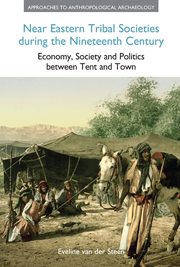 Near Eastern Tribal Societies during the Nineteenth Century
Near Eastern Tribal Societies during the Nineteenth Century As regards the individual nature, woman is defective and misbegotten, for the active power of the male seed tends to the production of a perfect likeness in the masculine sex; while the production of a woman comes from defect in the active power …
(Thomas Aquinas, Summa Theologica, First Part, Question 92, Article 1)As a rule, I am bound to say, we had courteous treatment from all, even when they robbed us.
(Jane Lethaby, 1887)Introduction
Western travellers were often shocked by the treatment of women in Near Eastern tribal societies. Burckhardt (1830: 199) is very clear about how, in his opinion, Bedouin and Arab tribes viewed the “weaker sex”:
Women are regarded as beings much inferior to men, and, although seldom treated with neglect or indifference, they are always taught that their sole business is cooking and working … They grind wheat in the hand-mill, or pound it in the mortar; they prepare the breakfast and dinner; knead and bake the bread; make butter, fetch water, work at the loom, mend the tent-covering, and are, it must be owned, indefatigable; while the husband or brother sits before the tent smoking his pipe, or, perceiving that a stranger has arrived in the camp, by the extraordinary volume of smoke issuing from the moharrem of the tent where the stranger has been received as a guest, to that tent he goes, salutes the stranger, and expects an invitation to dine and drink coffee with him.
To save this book to your Kindle, first ensure [email protected] is added to your Approved Personal Document E-mail List under your Personal Document Settings on the Manage Your Content and Devices page of your Amazon account. Then enter the ‘name’ part of your Kindle email address below. Find out more about saving to your Kindle.
Note you can select to save to either the @free.kindle.com or @kindle.com variations. ‘@free.kindle.com’ emails are free but can only be saved to your device when it is connected to wi-fi. ‘@kindle.com’ emails can be delivered even when you are not connected to wi-fi, but note that service fees apply.
Find out more about the Kindle Personal Document Service.
To save content items to your account, please confirm that you agree to abide by our usage policies. If this is the first time you use this feature, you will be asked to authorise Cambridge Core to connect with your account. Find out more about saving content to Dropbox.
To save content items to your account, please confirm that you agree to abide by our usage policies. If this is the first time you use this feature, you will be asked to authorise Cambridge Core to connect with your account. Find out more about saving content to Google Drive.